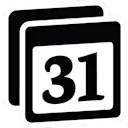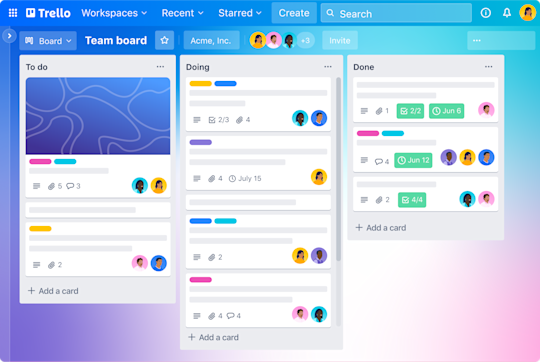Back to all comparisons
Notion Calendar vs Trello
Comprehensive comparison to help you choose the right tool for your needs

Notion Calendar
4.4
Notion Calendar is a comprehensive tool for managing time and work together. It integrates seamlessly with Google Calendar, allowing you to view and manage events alongside project timelines in Notion. The calendar offers built-in scheduling, time zone support, and a modern design, making it ideal for both personal and professional use. It's available in multiple languages and can be accessed on various platforms.
Free
Visit Website 
Trello
4.6
Trello is a visual collaboration tool for planning tasks and projects. With an intuitive interface of boards, lists, and cards, it helps teams organize work and manage projects effectively.
Free Plan for individuals and small teams, Standard Plan at $5 per user/month (billed annually), Premium Plan at $10 per user/month (billed annually), and an Enterprise Plan for larger organizations at $17.50 per user/month (billed annually)
Visit Website Quick Summary
Notion Calendar Strengths
- Google Calendar Integration: This feature allows users to seamlessly connect their Google Calendar with Notion, enabling efficient management of events and meetings within a unified interface. It simplifies scheduling and updating events across platforms.
- Meeting Booking Functionality: Notion Calendar offers a user-friendly interface for scheduling meetings. This includes options for setting up recurring meetings, sending invitations, and managing RSVPs, streamlining the meeting planning process.
- Notion Page Connectivity: Users can link calendar events to specific Notion pages, facilitating better organization and access to related notes, tasks, or documents associated with an event. This integration enhances productivity and project management.
- Video Conferencing Integration: The calendar supports adding video conferencing links from popular platforms like Zoom and Google Meet directly into event details. This feature is particularly useful for remote teams and virtual meetings, offering convenience and efficiency.
Trello Strengths
- Board Organization: Trello's boards enable visual management of projects using lists and cards, enhancing visibility and tracking.
- Customizable Cards: Cards can be enhanced with descriptions, checklists, labels, and attachments, providing essential task details in one place.
- Team Collaboration: The platform supports real-time team collaboration, ensuring everyone is updated and in sync.
- Drag-and-Drop Interface: Its intuitive interface allows easy movement of cards between lists for updating priorities and workflow.
Notion Calendar Screenshot
:format(webp)/cdn.vox-cdn.com/uploads/chorus_asset/file/25231452/NotionCalendar_Asset__1_.png)
Trello Screenshot

Feature Comparison
| Feature | Notion Calendar | Trello |
|---|---|---|
| Platforms | macOS, iOS, Android, Web, Windows | macOS, iOS, Android, Web, and Windows |
| Integrations | Notion, Zoom, Google Calendar | Trello integrates with several apps including Google Drive, Google Chat, Google Hangouts, Google Slides, Jira, Slack, GitHub, Dropbox, and Zendesk |
| Calendar | Yes | Yes. Trello offers a Calendar view which is available for Premium and Enterprise plans. |
| Task Management | No | Trello provides features like advanced checklists, labels for prioritization, and the ability to manage recurring tasks |
| Natural Language Processing | No | No |
| Analytics | No | Trello offers basic task analytics, particularly when integrated with tools like Zapier and Google Sheets for data analysis. |
| Time Blocking | Yes | While Trello itself does not have a native time blocking feature, it can be used in conjunction with time blocking techniques |
| Time Zones | Yes | Yes |
| Scheduler | Yes | No |
| Notifications | Yes | Yes |
| Pricing | Free | Free Plan for individuals and small teams, Standard Plan at $5 per user/month (billed annually), Premium Plan at $10 per user/month (billed annually), and an Enterprise Plan for larger organizations at $17.50 per user/month (billed annually) |
| Customer Support | Average | Good |
Video Overview
Notion Calendar Video
Trello Video
Notion Calendar Overview
The Notion Calendar, previously known as Cron Calendar, is a calendar application designed for managing meetings and events. It integrates closely with Notion documents, allowing users to connect their Google calendars, schedule meetings, manage events, and collaborate on upcoming events. It supports video conferencing links for platforms like Zoom and Google Meet, offers color coding for time blocking, and has deep integrations with Notion databases.
Pricing Details
Notion Calendar is free to use for Notion users
Trello Overview
It's known for its easy-to-use Kanban board approach but also offers other views like timelines and calendars. Trello is great for visual organization and team collaboration, with features like customizable cards, labels, and notifications. However, it may be less feature-rich compared to some alternatives like ClickUp or Monday.com, particularly in areas like advanced reporting or analytics. Trello's simplicity makes it accessible but might not suffice for complex project management needs.
Pricing Details
Trello offers several pricing plans: (i) Free Plan: $0, suitable for individuals or small teams to organize projects. (ii) Standard Plan: $5 per user/month (billed annually) or $6 monthly, for small teams needing work management and collaboration scaling. (iii) Premium Plan: $10 per user/month (billed annually) or $12.50 monthly, for teams tracking multiple projects with various visualization tools. (iv) Enterprise Plan: $17.50 per user/month (billed annually), providing connectivity, security, and controls for organizations.
Notion Calendar Key Features
Google Calendar Integration: This feature allows users to seamlessly connect their Google Calendar with Notion, enabling efficient management of events and meetings within a unified interface. It simplifies scheduling and updating events across platforms.
Meeting Booking Functionality: Notion Calendar offers a user-friendly interface for scheduling meetings. This includes options for setting up recurring meetings, sending invitations, and managing RSVPs, streamlining the meeting planning process.
Notion Page Connectivity: Users can link calendar events to specific Notion pages, facilitating better organization and access to related notes, tasks, or documents associated with an event. This integration enhances productivity and project management.
Video Conferencing Integration: The calendar supports adding video conferencing links from popular platforms like Zoom and Google Meet directly into event details. This feature is particularly useful for remote teams and virtual meetings, offering convenience and efficiency.
Color Coding and Time Blocking: Notion Calendar allows users to color code their events for better visual organization. The time blocking feature helps in allocating specific time slots for tasks, aiding in time management and daily planning.
Cross-Platform Availability: It is accessible on various platforms including iOS, Windows, Mac, and the web. This cross-platform availability ensures users can manage their calendars and stay organized regardless of the device they are using.
Trello Key Features
Board Organization: Trello's boards enable visual management of projects using lists and cards, enhancing visibility and tracking.
Customizable Cards: Cards can be enhanced with descriptions, checklists, labels, and attachments, providing essential task details in one place.
Team Collaboration: The platform supports real-time team collaboration, ensuring everyone is updated and in sync.
Drag-and-Drop Interface: Its intuitive interface allows easy movement of cards between lists for updating priorities and workflow.
Labels and Filters: These help in categorizing and organizing tasks, with customizable label colors and names.
Notifications and Reminders: They keep users informed about due dates and important updates, ensuring task deadlines are met.
Conclusion: Which Tool Should You Choose?
Both Notion Calendar and Trello offer unique features and benefits for productivity and workflow management. The best choice depends on your specific needs, team size, and workflow preferences.
Choose Notion Calendar if:
- Google Calendar Integration: This feature allows users to seamlessly connect their Google Calendar with Notion, enabling efficient management of events and meetings within a unified interface. It simplifies scheduling and updating events across platforms.
- Meeting Booking Functionality: Notion Calendar offers a user-friendly interface for scheduling meetings. This includes options for setting up recurring meetings, sending invitations, and managing RSVPs, streamlining the meeting planning process.
- Notion Page Connectivity: Users can link calendar events to specific Notion pages, facilitating better organization and access to related notes, tasks, or documents associated with an event. This integration enhances productivity and project management.
Choose Trello if:
- Board Organization: Trello's boards enable visual management of projects using lists and cards, enhancing visibility and tracking.
- Customizable Cards: Cards can be enhanced with descriptions, checklists, labels, and attachments, providing essential task details in one place.
- Team Collaboration: The platform supports real-time team collaboration, ensuring everyone is updated and in sync.